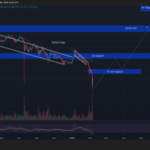Last updated:
 Why Trust Cryptonews
Why Trust Cryptonews
Ad Disclosure
We believe in full transparency with our readers. Some of our content includes affiliate links, and we may earn a commission through these partnerships.

India’s stance on crypto regulation continues to evolve, reflecting a balancing act between innovation, investor protection, and economic stability.
In a recent statement to the Lok Sabha, the government acknowledged the challenges of regulating virtual digital assets (VDAs) without international collaboration.
While taxation on crypto-related income and anti-money laundering measures are already in place, the absence of a comprehensive regulatory framework still presents a problem due to digital assets’ borderless nature.
There is no definitive timeline for introducing such guidelines. However, India has reiterated its commitment to working alongside global counterparts to address the vulnerabilities and opportunities in this crypto sector.
Is India Preparing Massive Comeback?
The Indian government’s approach to VDAs has relied on a patchwork of existing laws and policies.
Since March 2023, VDA transactions have been brought under the purview of the Prevention of Money Laundering Act (PMLA). It enables authorities to scrutinize the origins and movement of crypto-related funds.
Additionally, income from VDAs is taxed under the Income Tax Act 1961.
Other legal frameworks, such as the Information Technology Act 2000 and the Companies Act 2013, further regulate certain aspects of the digital asset ecosystem.
However, while necessary, these measures fail to address the unique challenges VDAs pose.
The government recognizes that crypto assets operate beyond national borders, making them inherently difficult to regulate through domestic frameworks alone.
As a result, India has emphasized the importance of global collaboration to prevent regulatory arbitrage—where businesses exploit differences in rules across jurisdictions.
During its G20 presidency in 2023, India was pivotal in advancing the global crypto discourse.
Adopting the IMF-FSB Synthesis Paper and the G20 Roadmap on Crypto Assets showed the urgency of unified international action.
These initiatives laid the groundwork for risk-sensitive regulations, urging nations, particularly emerging economies, to align their policies and develop safeguards against financial instability.
Despite this, the government has admitted that it is not yet ready to commit to a timeline for a comprehensive domestic regulatory framework.
Challenges in Evolving Crypto Sector
While India has emerged as a leader in global crypto adoption, they claimed the the sector’s rapid growth has exposed significant vulnerabilities.
One of the most pressing concerns is investor protection. The cross-border nature of VDAs limits the effectiveness of purely domestic safeguards, which they rule as exposing investors to fraud and other risks.
The government’s response to such challenges has been twofold. On one hand, it seeks to ensure that innovation in the crypto space is not stifled. On the other hand, it is working to implement measures that protect investors without undermining financial stability.
These dual objectives are not easily reconciled, particularly in a sector as dynamic and unpredictable as cryptocurrency.
Stakeholder consultations have played a key role in shaping India’s approach to VDAs.
Reflecting India’s stance on crypto, in a recent exclusive interview with CryptoNews, Bitget COO Vugar Usi Zade shared the exchange’s strategy for entering India’s burgeoning crypto market, highlighting challenges posed by local taxation policies.
He expressed concerns over India’s steep crypto taxes, including a 30% tax on profits and a 1% tax deducted at source (TDS) on each transaction, which he believes could push users toward black-market activities.
Usi Zade stressed the importance of clear legislation to foster a healthy crypto ecosystem, describing the current tax regime as a significant barrier for users and businesses.



















